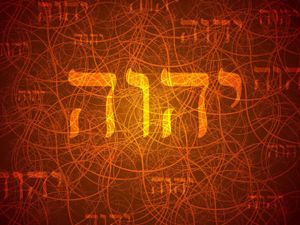
If you’ve ever ventured to do any sort of Biblical research or so much as looked up a word in a concordance, you’ve more than likely stumbled upon the Hebrew word elohim (אלהים). There is a great deal of misinformation being spread about this word. The goal of this article is to clear up the confusion about elohim and reveal its origin, meaning, and usage in the Hebrew Scriptures.
For those who don’t have the slightest clue what elohim means, we will start by defining it according to the Strong’s Concordance:
Strong’s H430 – אֱלֹהִים
[1] (plural)
a)rulers, judges
b)divine ones
c)angels
d)gods
[2] (plural intensive – singular meaning)
a)god, goddess
b)godlike one
c)works or special possessions of God
d)the (true) God
e)God
As you can see, elohim is used of everything from false gods to mighty men, but most often it is used of YHWH, the God of Yisra’el. It is the plural form of eloah (אֱלוֹהַּ) and makes its debut in the Hebrew Bible in Genesis 1:1, which reads:
Literal English: In-beginning he-created God, the-heavens and the-earth.
In this verse (and many others) elohim is modified by a singular verb (this case, bara). Due to this fact, a myriad of Trinitarian apologists have used this as an argument for their erroneous assumption that YHWH is “3 in 1″. Their all-time favorite “proof text” for this argument is Genesis 1:26which reads:
“Then God said, ‘Let usmake man in ourimage, after ourlikeness…’ “
Since elohim refers to himself in the plural “us” and “our”, Trinitarians jump to the conclusion that there must be a plurality in YHWH, thus proving the trinity to be true. This, however, shows how ignorant they are of the Hebrew language. No Hebrew grammarian would dare make such an asinine claim! YHWH is refered to over 20,000 times in the Tanakh with singular pronouns. Not to mention the hundreds of passages speaking of the uniqueness of YHWH (there are too many to quote here) and most importantly, the Sh’ma (Deuteronomy 6:4).
The passages which YHWH elohim speaks of himself in plural number a measly four. That’s right, only four. Those are: Genesis 1:26, 3:22, 11:7, and Isaiah 6:8. Although, YHWH is not the only singular being in Scripture to have been given a title of plurality. Here are a few examples among many:
1. Behemoth (plural of behemah, “beast”) is modified by the singular verb yokhal “he eats” in Job 40:15. Behemoth, though plural, is one creature and an extremely mighty creature at that (Job 40:16-24).
2. King Artaxerxes of Persia, in his follow-up letter to the Jews, said “the letter which you sent to us has been plainly read before me” (Ezra 4:18). Artaxerxes is one man, a mighty man, a king.
3. YHWH said to Mosheh, “I will make you a god to Pharaoh” in Exodus 7:1. The word for “god” is elohim. Mosheh was a man, not an army, yet he was given the title of elohim.
4. The father if the Hittites called Avraham his lord (adoni) and elohim (mighty one) in Genesis 23:6. Was Avraham more than one? No.
5. The pagan deities Ba’al, Dagon, and Chemosh are all called elohim (Judges 6:31, 1 Samuel 5:7, Judges 11:24), though we know they are individually only one god, not a pantheon or “Godhead”.
This concept of assigning a plural pronoun such as “we” to a single entity is the “Majestic Plural”. It is used to ascribe glory and honor to the one (or thing) to which it is mentioning. Not only is it used of mighty beasts, kings, and gods, but it’s also used of non-sentient nouns. One example is Genesis 4:10. When Cain slew Abel, the Hebrew literally says “your brother’s bloods cry up from the ground”. This is to show the severity of Cain’s actions. Likewise, in Ezekiel 25 YHWH says that because the Philistines took vengeance (verse 15) he will execute vengeance upon them (verse 17). However, YHWH’s vengeance in verse 17 is plural; denoting that the vengeances he inflicts will be much more severe and complete.
The renowned Hebraist, Wilhelm Gesenius remarked in page 399 of his work Gesenius’ Hebrew Grammar concerning the Majestic Plural:
“That the language has entirely rejected the idea of numerical plurality in אֱלֹהִים(whenever it denotes one God), is proved especially by its being almost invariably joined with a singular attribute (cf. § I32 h), e.g. אֱלֹהִים צַדִּֽיק ψ 710, &c. Hence אֱלֹהִים may have been used originally not only as a numerical but also as an abstract plural (corresponding to the Latin numen, and our Godhead), and, like other abstracts of the same kind, have been transferred to a concrete single god (even of the heathen).”
There you have it. Whenever elohim is referring to a singular God (e.g. YHWH) it is abundantly clear that the idea of there being a plurality or a “uni-plurality” (as the Trinitarians put it) is totally foreign to the Hebrew language. Such claims are merely cheap tactics meant to circumvent and explain away the text rather than address it head on. So once again the central truth of Scripture stands firm:
Listen Yisra’el! YHWH your God, YHWH is ONE.
Isaiah 43:10 - You are My witnesses, declares יהוה, And My servant whom I have chosen, so that you know and believe Me, and understand that I am He. Before Me there was no El formed, nor after Me there is none.





